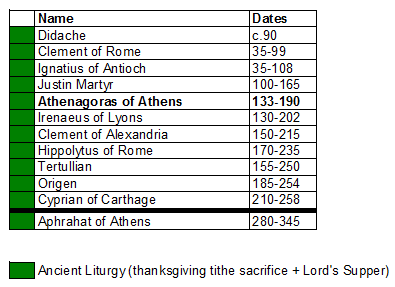The original liturgy:

The Roman liturgy:

Athenagoras of Athens (133-190)
Athenagoras is one of the earliest patristic writers that we examine in this series. He wrote sometime in the middle or late second century, well before the innovations of the late 4th-century. Here is what he had to say on the topic of sacrifices. I’ve reproduced the entire chapter here:
But, as most of those who charge us with atheism, and that because they have not even the dreamiest conception of what God is, and are doltish and utterly unacquainted with natural and divine things, and such as measure piety by the rule of sacrifices, charges us with not acknowledging the same gods as the cities, be pleased to attend to the following considerations, O emperors, on both points. And first, as to our not sacrificing: the Framer and Father of this universe does not need blood, nor the odour of burnt-offerings, nor the fragrance of flowers and incense, forasmuch as He is Himself perfect fragrance, needing nothing either within or without; but the noblest sacrifice to Him is for us to know who stretched out and vaulted the heavens, and fixed the earth in its place like a centre, who gathered the water into seas and divided the light from the darkness, who adorned the sky with stars and made the earth to bring forth seed of every kind, who made animals and fashioned man. When, holding God to be this Framer of all things, who preserves them in being and superintends them all by knowledge and administrative skill, we lift up holy hands to Him, what need has He further of a hecatomb?
To do aright, by sacrifice and pray’r,
Libations and burnt-offerings, may be soothed.
And what have I to do with holocausts, which God does not stand in need of?— though indeed it does behoove us to offer a bloodless sacrifice and the service of our reason.
Citation: Athenagoras of Athens, “A Plea for the Christians.” §13
Since his discussion is laser-focused on sacrifice, he has absolutely nothing to say about the (1) Dismissal, (4) Consecration, or (5) Lord’s Supper. He is concerned only with the (2-3) sacrifice of the Eucharist.
Athenagoras is very clear that what is offered is bloodless. One would be hard-pressed to say that Athenagoras believed that the literal blood of Christ was being offered as a bloodless sacrifice. The whole point is that no real blood is involved. If Athenagoras believed that the wine became actual blood, those he was speaking to would not have understood.
While FishEaters didn’t reference Athenagoras, she did talk about an unbloody sacrifice in another post:
Citation: FishEaters, “The Eucharist.”
This is referenced in the Catholic Catechism:
From 375 to 380, two centuries after Athenagoras, the term “unbloody sacrifice” originated in the Apostolic Constitutions, a Syrian work of the late 4th-century. Roman apologists talk of the wine (and bread) being in the appearance of wine (and bread), but being flesh and blood in substance. It is not clear how this qualifies as unbloody. So let’s look at the original source and see if we find the ancient or the Roman liturgy:
You, therefore, O bishops, are to your people priests and Levites, ministering to the holy tabernacle, the holy Catholic Church; who stand at the altar of the Lord your God, and offer to Him reasonable and unbloody sacrifices through Jesus the great High Priest.
…
Those which were then the sacrifices now are prayers, and intercessions, and thanksgivings. Those which were then first-fruits, and tithes, and offerings, and gifts, now are oblations, which are presented by holy bishops to the Lord God, through Jesus Christ, who has died for them.
Citation: “Apostolic Constitutions, Book II.” §4
Instead of a bloody sacrifice, He has appointed that reasonable and unbloody mystical one of His body and blood, which is performed to represent the death of the Lord by symbols.
Citation: “Apostolic Constitutions, Book VI.” §4.23
…according to Your command; to loose every bond, according to the power which You gave the apostles; that he may please You in meekness and a pure heart, with a steadfast, unblameable, and unreprovable mind; to offer to You a pure and unbloody sacrifice, which by Your Christ You have appointed as the mystery of the new covenant…
Citation: “Apostolic Constitutions, Book VIII.” §2.5
…But after His ascension we offered, according to His constitution, the pure and unbloody sacrifice…
Citation: “Apostolic Constitutions, Book VIII.” §5.46
According to the Apostolic Constitutions, the unbloody sacrifice is the eucharist of a pure heart and unreprovable mind. This is precisely what we’ve seen in our series so far: the sacrifice that the church offered was a (2-3) thanksgiving—or Eucharist—of tithes, gifts, service and good works, gratitude, prayers, praise, hymns, and a pure heart. Of these, the heart is an all-encompassing Hebrew idiom which includes the mind (as in the Jewish Shema as quoted by Jesus). Athenagoras agrees:
We offer as our thanksgiving sacrifice—our Eucharist—a pure mind set on God. On this, both Athenagoras and the Apostolic Constitutions agree.
When we discuss Eusebius, we will see that he also agreed with this characterization of the bloodless sacrifice. As with the other patristic writers, the Roman liturgy—with its idea of an unbloody sacrifice of the literal, actually present blood of Christ—the Roman liturgy cannot be found in Athenagoras.


Pingback: The Eucharist, Part 16: Apostolic Constitutions
Pingback: The Eucharist, Part 21: Eusebius of Caesarea